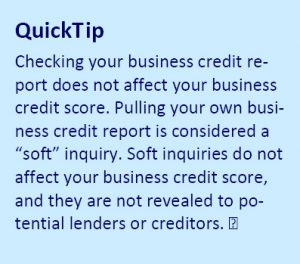Oct 6, 2016
There are many risks associated with a poor business credit score. The good news is, there are many things you can do to improve your business’s credit score and maintain a high credit score as your company grows. In the following pages, we’ll show you five simple steps you can take to improve your company’s credit score.
Action 1: Check
Your business credit report is used to make important financial decisions about your company—how much money lenders will loan, how much credit suppliers will extend and what interest rates to charge. That’s why it’s so important to know what your business credit report contains.
What if I Don’t Have a Credit Score?
Your business may not have a credit score with Experian. Experian requires certain minimum information (one tradeline and/or one demographic element, such as years in business or number of employees) to generate a business credit report and score. If your business doesn’t meet the requirements, a credit report and score is not generated.
Because a business credit score is so important, you’ll want to establish a business credit report for your company. Here are the steps to take:
- If you haven’t already done so, incorporate or form an LLC for your business. Unlike a sole proprietorship, incorporating or forming an LLC enables you to build business credit separate from your personal credit profile.
- Take the proper steps to meet the requirements of the credit market. Follow basic startup steps such as getting a business license; meeting local, state, and federal requirements; and having a business address and phone line.
- Prepare financial statements and a business plan. Most credit grantors will want to see these before granting credit.
- Find companies that will extend credit to your business without requiring a personal guarantee or checking your personal credit. Make sure that companies that grant you credit report your prompt payments to business credit bureaus such as Experian. This is a key step in building your business’s credit score.
Action 2: Correct
Your business credit profile is the basis for many of the decisions others make about your company. It is used to determine how much money lenders will loan you, how much credit suppliers will extend to you, what interest rates you’ll be charged and what you’ll pay for insurance premiums. That’s why it’s important to know what’s in your business credit report, make sure it is accurate, and correct any errors or outdated information.
What Factors Affect My Credit Score?
There are a number of factors that can negatively affect your company’s business credit score. These include:
- The presence of derogatory public records on the business profile, such as collections, liens, judgments, or bankruptcies
- The status, recency, frequency, and dollar amounts of any applicable liens, judgments, or bankruptcies
- An increased trend toward slow payment
- An increase in the number of business credit inquiries or applications generated by the business or owner
- The number of trade experiences, balances outstanding, payment habits, credit use and trends over time
- Years in business, line of business or Standard Industrial Classification (SIC), size of business and other demographic data
Correct Errors and Outdated Information
Your credit report paints a picture of your business for the world to see. Outdated or incorrect information can give the wrong impressions about your business, resulting in unfavorable decisions that negatively impact your bottom line. To keep your credit score in good shape, it’s important to be proactive.
Action 3: Grow
It’s no exaggeration to say that your business credit is the single most important factor in growing your business. Your business credit score is one of the first things that lenders, suppliers, and even some customers look at before deciding to do business with you. A poor business credit score can make it difficult, or even impossible, to get funding and obtain lines of credit for your business. With good business credit, however, you can obtain the capital and lines of credit you need to grow your business and serve new customers.
The first step in improving your score is to become aware of the factors that drive your current company credit score. By managing these more effectively, you can make a positive impact on your credit score, which can lead to more opportunities to grow your business.
Just like your personal credit report, Experian only accepts company credit and payment history from creditors and suppliers. Choose lenders, suppliers, and creditors that report your payment history to the credit bureaus. If your current creditors or suppliers do not report to Experian, you can request that they do so. Last, but not least, manage your finances well and make all of your payments on time so you build a strong credit history.
For moreinformation on maintaining your business credit score please contact NACM Northwest.


Tami Mason
can I use this article for a website we have? It is very informative
Amanda Garrick
Hi Tami,
The article was given to us to use by Experian. You would need to contact them for permission. You can definitely share this link. Thank you so much for asking.